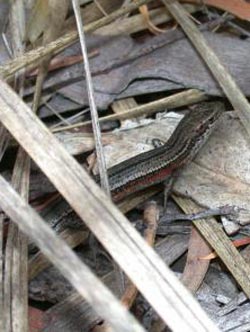Lizard moms may prepare their babies for a stressful world

Skink mothers under stress allocate more energy to self-preservation at the cost of their developing offspring. But the rough start may actually be a benefit to the babies once they're born. Credit: Erik Wapstra<br>
Stress changes the way animals allocate energy. During predator attacks or food shortages, hormones are released that help the body to access stored energy. But for pregnant females there's a potential trade-off. Stress hormones could rob precious energy from developing embryos, leading to offspring that aren't as healthy.
A research team led by Erik Wapstra of the University of Tasmania, Australia, tested the effects of stress on southern grass skinks, which, unlike many lizards, give birth to live young rather than laying eggs.
In the lab, the researchers recreated the physiology of a stressful situation by artificially raising levels of the stress hormone corticosterone in pregnant skins. Other skinks had their food intake limited, recreating the stress of a food shortage. The team then measured the health of the stressed mothers and their eventual offspring, and compared their state to mothers and offspring that weren't under stress.
The study found that stressed moms gave birth to smaller offspring that grew more slowly than those born to low-stress mothers. Stressed mothers themselves were found to be in better physical shape after giving birth than non-stressed mothers. That's a signal that when stressors are present, mothers tend to allocate energy to self-preservation first.
Despite seemingly getting the short end of the stick, the news wasn't all bad for offspring of stressed mothers. “We found that small offspring had larger fat reserves relative to body size…, which may enhance offspring survival in a stressful post-natal environment,” the researchers write. Previous studies have also shown that smaller juvenile lizards often do better when predator density is high or when food availability is low.
It appears that a mother's stress-induced selfishness may actually help to pre-adapt her babies for a stressful world.
Keisuke Itonaga, Susan M. Jones, and Erik Wapstra, “Do Gravid Females Become Selfish? Female Allocation of Energy during Gestation.” Physiological and Biochemical Zoology 85:3 (May/June 2012).
Physiological and Biochemical Zoology primarily publishes original research papers in animal physiology and biochemistry with a specific emphasis on studies that address the ecological and/or evolutionary aspects of physiological and biochemical mechanisms. Studies at all levels of biological organization from the molecular to the whole organism are welcome, and work that integrates levels of organization to address important questions in behavioral, ecological, evolutionary or comparative physiology is particularly encouraged.
Media Contact
More Information:
http://www.uchicago.eduAll latest news from the category: Life Sciences and Chemistry
Articles and reports from the Life Sciences and chemistry area deal with applied and basic research into modern biology, chemistry and human medicine.
Valuable information can be found on a range of life sciences fields including bacteriology, biochemistry, bionics, bioinformatics, biophysics, biotechnology, genetics, geobotany, human biology, marine biology, microbiology, molecular biology, cellular biology, zoology, bioinorganic chemistry, microchemistry and environmental chemistry.
Newest articles

Trotting robots reveal emergence of animal gait transitions
A four-legged robot trained with machine learning by EPFL researchers has learned to avoid falls by spontaneously switching between walking, trotting, and pronking – a milestone for roboticists as well…

Innovation promises to prevent power pole-top fires
Engineers in Australia have found a new way to make power-pole insulators resistant to fire and electrical sparking, promising to prevent dangerous pole-top fires and reduce blackouts. Pole-top fires pose…

Possible alternative to antibiotics produced by bacteria
Antibacterial substance from staphylococci discovered with new mechanism of action against natural competitors. Many bacteria produce substances to gain an advantage over competitors in their highly competitive natural environment. Researchers…





















